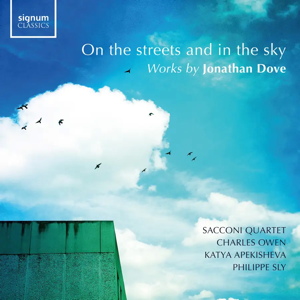
Jonathan Dove (b. 1959)
On the streets and in the sky
On the streets and in the sky, String Quartet No. 2 (2021)
Between friends, for two pianos 92019)
Who Wrote the Book of Love? for baritone and string quartet (2014)
Vanishing Gold, for string quartet (2019)
Philippe Sly (baritone), Sacconi Quartet, Charles Owen and Katya Apekisheva (pianos)
rec. 2023, Menuhin Hall, Stoke d’Abernon, Cobham, UK
English texts included
Signum Classics SIGCD793 [75]
Jonathan Dove is one of the most successful of modern British composers, having composed over thirty operas and many other works, a number of them for young people. His attractive and accessible music is in the tradition of composers such as Britten. His best-known work is probably the opera Flight, which deals with a group of characters who get stuck in an airport, and which has had several productions.
Here we have a group of chamber works, including a song cycle. The title work is a string quartet, the second Dove has written for the medium, the first being some twenty years earlier. He wrote it during the lockdown from the Covid pandemic, and the opening movement reflects the anxiety and fear which characterised that time. There are driving rhythms, a jagged line and sudden explosions but also an anguished melody on the viola which comes in as if from another world. The second movement begins with evocations of birdsong which lead into a cello solo, written very high on the instrument. This leads directly into the finale, which is slow moving and lyrical, with its pitch gradually rising to an almost ecstatic end.
We then have Between friends, which is a work for two pianos, divided into movements termed Conversations. After a prelude we are launched into a moto perpetuo, Dancing, in a version of the idiom of early minimalism, with its characteristic ostinatos and repetitions but with more irregular accents and frequent changes of figuration. There follows Spacious, which is an exchange of chords with frequent evocations of bell sounds. Finally, we have a movement marked Lively and playful, with mischief, which is whimsical and tricksy, featuring at times a tarantella and a kind of manic boogie-woogie.
The song cycle Who wrote the Book of Love? is for baritone and string quartet. This traces in seventeen short numbers the story of a love affair from initial rapture through various vicissitudes to final separation and relief. The texts are by Dove’s long-term collaborator the librettist Alasdair Middleton, and I say texts rather than poems, as most of them are short aphoristic sayings without rhyme or metre. Some are very short indeed – number ten of the seventeen numbers asks, in its entirety ‘Who wrote the Book of Love | and why?’ Needless to say the question does not get asn answer, any more than it did the 1957 hit song by the Monotones with the same title. Some of the texts are, however, proper poems. The cycle gets off to a bad state with five songs all of which are slow and for which the vocal setting is a kind of shapeless arioso. Thereafter matters improve and the faster numbers also have the better texts, with Gypsy Love being particularly effective, though the words are weird.
Finally, we have a short work for string quartet, Vanishing Gold. The title refers to two creatures which may now be extinct, the golden toad of Costa Rica and the golden coqui (a kind of frog) of Puerto Rico. This begins in a playful and lighthearted way but the mood darkens and the ending is elegiac.
The performances here are exemplary: the Sacconi Quartet are long-term collaborators with Dove, in particular for his previous song cycle with quartet, In Damascus. The baritone Philippe Sly joins them for Who Wrote the Book of Love? and it was written for him. The two-piano work Between friends stands rather apart from the other works; here Charles Owen and Katya Apekisheva despatch it expertly. The recordings are good, with the right degree of resonance. This is the latest in several collections of Dove’s work by Signum Classics, and their continued sponsorship of him is much to be commended.
Stephen Barber
Buying this recording via a link below generates revenue for MWI, which helps the site remain free.



















